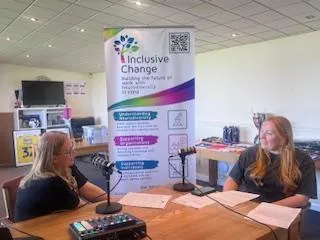
Inclusion in Action: How North Somerset Sports Foundation Is Changing the Game
Continuing the Conversation on Neurodiversity and Football with Lucy Chappell
What happens when we stop expecting young people to fit into rigid systems and instead build environments around how they truly thrive?
That’s the driving question behind this Project Sandbox podcast episode, where Lucy from Inclusive Change sits down with Lucy Chappell, founder of the North Somerset Sports Foundation, to explore neurodiversity, inclusion, and how grassroots football can become a force for real social impact.
A New Kind of Sports Foundation
The North Somerset Sports Foundation isn’t just about playing matches, it’s about wellbeing, community, and creating space where everyone feels safe. Since taking over a sports site in Clevedon, Lucy Chappell and her team have been working to build what she describes as a "sports and wellness village." It's a place where children and families of all backgrounds and abilities are welcomed, supported, and empowered to thrive.
This ambitious project runs alongside Lucy’s role as Welfare Officer at North Somerset Football Club, something that highlights just how personally committed she is to making inclusive sport a reality.
“We’re building a thriving community united by fitness, wellness, and sports where every individual, regardless of age, background, or ability, has the opportunity to grow, connect and excel.”
The Overlap of Mental Health and Neurodiversity
What began with a focus on mental health soon became a much broader conversation. As Lucy began working more closely with families and coaches, she noticed a recurring theme: children experiencing anxiety or behavioural challenges were often later diagnosed as neurodivergent.
Recognising this pattern led to a deeper understanding of how football clubs, often one of the few consistent spaces in a child’s life, can be part of early identification and support.
“So many families experience blame before they get any support. If we start conversations earlier, we can change lives.”
Lucy also shared her personal journey as a parent, and the difficult but essential decision to remove her son from mainstream schooling to protect his wellbeing. These experiences fuel her drive to make football more inclusive, understanding, and responsive.
Changing Perceptions, Unlocking Strengths
The conversation highlighted how vital it is to reframe what we view as "behavioural problems" or "learning differences." These can often be signs of unmet needs or different processing styles.
In one powerful story, Lucy describes how her son appeared disengaged during training, wandering at the edge of the group, until the coach asked him to repeat what had been said. He recalled every instruction word-for-word. He wasn’t distracted, he was just processing differently.
“It’s not about changing the child. It’s about changing the environment around them.”
The podcast challenges us to stop asking how children will fit into sport, and instead ask how sport can flex to meet them where they are.
Practical Steps for Inclusion
The discussion offers a range of actionable strategies for clubs, coaches, and parents, including:
Simplifying instructions and breaking them down into small steps
Using visual aids and demonstrations during training
Building structure and communicating changes in advance
Normalising differences through open conversation
Incorporating ‘brain breaks’ for everyone in a session
Providing praise regularly and meaningfully
Developing flexible expectations not lowering them, but adjusting them
The key is to create an environment that supports every player without singling anyone out. These changes are beneficial for all, not just neurodivergent players.
Looking Ahead
Lucy envisions a future where neurodiversity training is a standard part of coach development, where football clubs create player support plans just like schools do, and where children feel safe and celebrated in sport from an early age.
“If we build these environments early, we may prevent the kinds of struggles that lead to isolation or mental health crises later. It starts with asking better questions, and listening closely to what young people need.”
The workshop North Somerset Football Club shared with coaches, volunteers and parents, in partnership with Inclusive Change has already been picked up by Somerset FA and Gloucestershire FA, helping to shift coach education at a broader level. It’s a promising sign that the seeds of inclusive change are taking root.
Listen to the Episode
This conversation is about more than football. It’s about redesigning systems to serve every kind of mind and building communities where everyone belongs.
Listen to the full episode via the Inclusive Change podcast and learn more about how the North Somerset Sports Foundation is creating meaningful impact through sport.
To get involved or explore digital inclusion through Project Sandbox, visit icall-cic.com/sandbox.